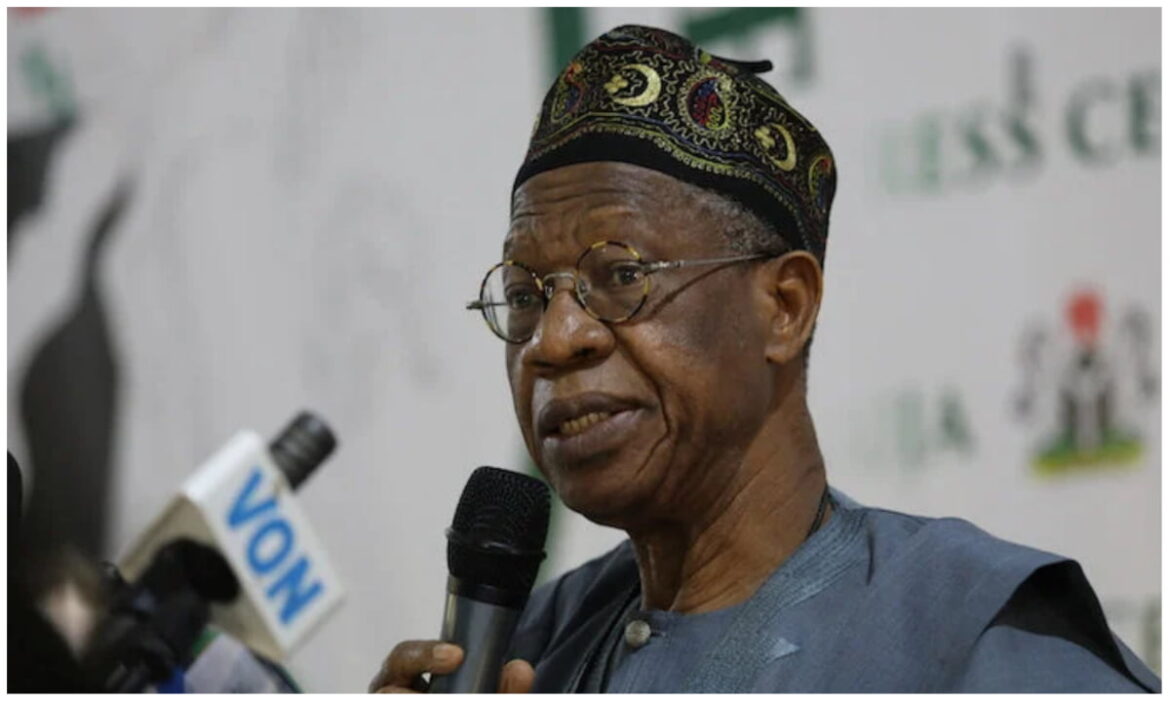By Asmau Ahmad
The Nigerian government has inaugurated the Special National Food and Nutrition Media Team as part of efforts to drive the success of nutrition programmes and interventions in the country.
Speaking at the inauguration ceremony, Minister of Information and Culture, Lai Mohammed, said the media, the fourth estate of the realm, and the watchdog of the society, has a huge and indispensable role to play in achieving the goals of the National Multi-sectoral Plan of Action on Food and Nutrition (NMPFAN).
Represented by the ministry’s Permanent Secretary, Lydia Jafiya, the minister said the media team has been critically selected based on national and sub-national coverage, relevance, integrity, capability, and performance.
He noted that there are gaps in nutrition investment in the country, hence the need to work with the media to spread the word on the importance of nutrition.
“This is another essential reason for setting up this media team, to harness the power of the watchdog to spread the word on nutrition and increase the outcomes thereof,” he said.
He said the team, with support from other nutrition stakeholders, will develop a National Nutrition Media Strategy, engage in continuous public nutrition literacy, and follow up on all issues relating to nutrition reporting, monitoring, and evaluation processes.
He noted that the effective and efficient monitoring of nutrition programmes through media spotlighting on nutrition issues and feedback mechanisms on the utilisation of resources expended on nutrition will improve accountability, “which will ultimately lead to an increase in nutrition investment by major stakeholders in the country.”
Prioritising nutrition
Lai Mohammed said nutrition is a critical part of health and development and also a key component of the Sustainable Development Goals (SDGs).
He said for the country to achieve SDGs by 2030, it must make meaningful progress in nutrition. “Suffice it to say that a critical tenet of attaining the SDGs is to make meaningful progress in nutrition,” he said.
“For this reason, it is imperative to tackle malnutrition because winning the fight against it will have far-reaching consequences on the improvement of the general health of the people, and a great stride towards ending poverty in our country.”
Quoting UNICEF, Mr Mohammed said malnutrition is the direct or underlying cause of 45 per cent of all deaths of under-five children.
He said Nigeria is ranked number one in Africa, and number two globally in terms of the number of malnourished children, with an estimated 14.7 million children under the age of five years predicted to suffer this year from wasting, a condition from moderate and severe to acute malnutrition.
He explained that malnutrition threatens the survival, growth, and development of millions of children.
Work in progress
The minister added that the government has demonstrated commitment towards addressing malnutrition in the country, “which led to the approval by the Federal Executive Council of NMPFAN, and the inclusion of nutrition in the National Development Plan.”
He said these are blueprints to guide and enhance nutrition security both at national and sub-national levels.
He said this also calls for urgent actions to strengthen current efforts by all stakeholders, to complement the government’s activities, and reverse the ugly trend.
In his goodwill message, the Senior Special Assistant to the President on Nutrition, Abimbola Adesanmi, said the federal government recognises nutrition as a crucial pillar in the development of a healthy and productive nation.
Ms Adesanmi, who was represented by the Communication Expert, National Council on Nutrition (NCN) Delivery Unit, Emmanuel Ohiomokhare, said this has been demonstrated by the current actions around the approval of the five-year plan of action, the inclusion of a chapter on food and nutrition in the NDP 2021-2025 and the approval of the establishment of nutrition departments across key MDAs.
She said the inauguration of the media team is a welcome development “at this time as it ensures an effective coordination of the media activities as covered in the plan and ultimately helps in the reduction of the morbidity and mortality associated with malnutrition.”




